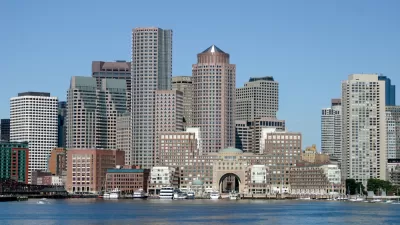Hurricane Sandy served as a wake up call for many cities to the dangers of rising seas and more extreme storms. To prepare for these threats, officials in Boston have proposed zoning rules that would require developers to detail mitigation measures.
"City officials proposed new zoning rules Tuesday that would require developers of large new buildings in Boston to submit plans to deal with flooding, heat waves, and other potential complications of climate change as sea levels and temperatures are projected to rise," reports David Abel.
“Climate change is rapidly and drastically altering the world in which we live, and Boston, like many other coastal cities, will suffer if we don’t take action,” Brian Swett, the city’s chief of environment and energy, said at a press conference announcing the rules. “We cannot and will not kick the can down the road for someone else to deal with, because this issue is not generations away; it’s right on our doorstep.”
"Swett said the proposed rules would require developers to fill out a lengthy checklist about their building’s ability to withstand floods, cope with power outages, and conserve energy, among other things," notes Abel. "But he said the city has no plans to institute blanket regulations about where a developer might house electrical systems or what kind of materials they use."
FULL STORY: New city zoning plans tied to changes in climate

Maui's Vacation Rental Debate Turns Ugly
Verbal attacks, misinformation campaigns and fistfights plague a high-stakes debate to convert thousands of vacation rentals into long-term housing.

Planetizen Federal Action Tracker
A weekly monitor of how Trump’s orders and actions are impacting planners and planning in America.

Chicago’s Ghost Rails
Just beneath the surface of the modern city lie the remnants of its expansive early 20th-century streetcar system.

Bend, Oregon Zoning Reforms Prioritize Small-Scale Housing
The city altered its zoning code to allow multi-family housing and eliminated parking mandates citywide.

Amtrak Cutting Jobs, Funding to High-Speed Rail
The agency plans to cut 10 percent of its workforce and has confirmed it will not fund new high-speed rail projects.

LA Denies Basic Services to Unhoused Residents
The city has repeatedly failed to respond to requests for trash pickup at encampment sites, and eliminated a program that provided mobile showers and toilets.
Urban Design for Planners 1: Software Tools
This six-course series explores essential urban design concepts using open source software and equips planners with the tools they need to participate fully in the urban design process.
Planning for Universal Design
Learn the tools for implementing Universal Design in planning regulations.
planning NEXT
Appalachian Highlands Housing Partners
Mpact (founded as Rail~Volution)
City of Camden Redevelopment Agency
City of Astoria
City of Portland
City of Laramie





























